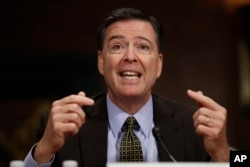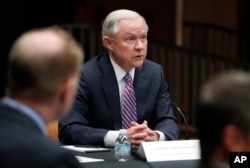President Donald Trump's abrupt firing of FBI director James Comey on Tuesday with a four-paragraph dismissal letter prompted many Democrats — and some Republicans — in the U.S. Senate and House to recommend the appointment of a special prosecutor to look into possible ties between Trump and Russian election interference, something Comey was investigating before he was fired.
How are members of Congress reacting to the firing of Comey?
Reactions from Republican senators range from praising the move, saying new leadership at the FBI would restore public trust in the organization, to surprise.
Democratic members of the Senate and House almost universally condemn the move. The ranking Democrat on the House Intelligence committee, Representative Adam Schiff, said an independent prosecutor would restore public confidence.
On the House Republican side, Representative Justin Amash tweeted Tuesday night that he is looking into the possibility of an independent commission.
What role could an independent commission play?
Many Democrats — including House Minority Leader Nancy Pelosi — have been calling for months for an independent panel to investigate the Russia issue. That panel would be modeled along the lines of the commission that investigated the 9/11 terrorist attacks.
These types of investigations are expensive because they require their own staffs — money that would have to be appropriated by Congress and signed into law by Trump.
A commission can serve an important role as an independent voice, made up of bipartisan experts and former government officials who are separate from the political concerns of investigations held by elected members of Congress. They also ask bigger-picture questions about how a situation occurred and how it can be avoided in the future.
Why would Trump approve money for an independent commission?
Public pressure for an independent investigation could push an administration to approve money for a commission, resolving lingering questions about transparency. But it would also add another investigative layer into an already crowded field and would likely take up an enormous amount of focus as Congress addresses health care, tax reform and a 2018 budget.
Who appoints a special counsel, and is it different from a special prosecutor?
"Special counsel" and "special prosecutor" are two ways of saying the same thing. Usually that person is a respected lawyer or former Justice Department prosecutor.
Before 1999, majorities of the Senate and House Judiciary Committees had the power to request the appointment of an independent counsel or prosecutor from a three-judge panel. That provision of the law expired and was not renewed.
Currently, the power resides with Attorney General Jeff Sessions, who has recused himself from any investigations into Russian election interference after recommendations from Justice Department ethics officials. The power to appoint a special counsel then falls to the deputy attorney general.
Congress can intensify public pressure for the appointment of a special prosecutor through continued committee investigations, or it could try to pass a law restoring the provisions that expired in 1999.
Aren't there already investigations going on in Congress?
There are multiple ongoing committee investigations into Russian interference in the U.S. election and what role — if any — Trump campaign associates may have played in that interference.
Then-FBI Director James Comey announced at a March 20 House Intelligence Committee hearing that his agency was investigating the matter. Many opponents of an independent commission point to the FBI investigation as a reason not to initiate another probe. That debate has been renewed, as the firing of Comey has revived questions about conflicts of interest and the independence of an FBI investigation.
What other options are at Congress' disposal?
The ultimate oversight option available to Congress is the power to impeach government officials, including the President of the United States. The impeachment proceedings move from the House, which indicts, to the Senate for trial. Two presidents — Andrew Johnson and Bill Clinton — have been impeached by the House of Representatives, but were acquitted by the Senate. Richard Nixon resigned before he could be impeached.
Impeachment proceedings can be initiated if the official has committed an offense defined as "treason, bribery, or other high crimes and misdemeanors." There is considerable debate about exactly how to define these terms.
Despite calls from Trump's critics, it is highly unlikely that a Republican-controlled Congress would initiate impeachment proceedings.






